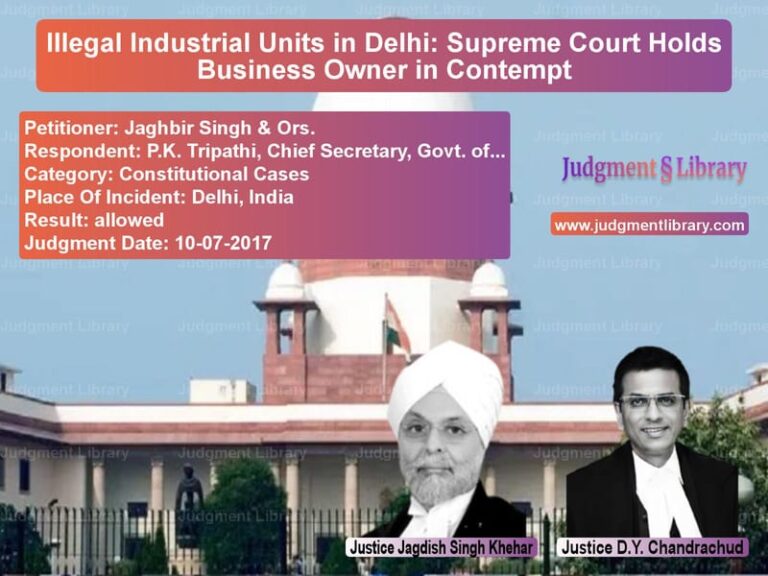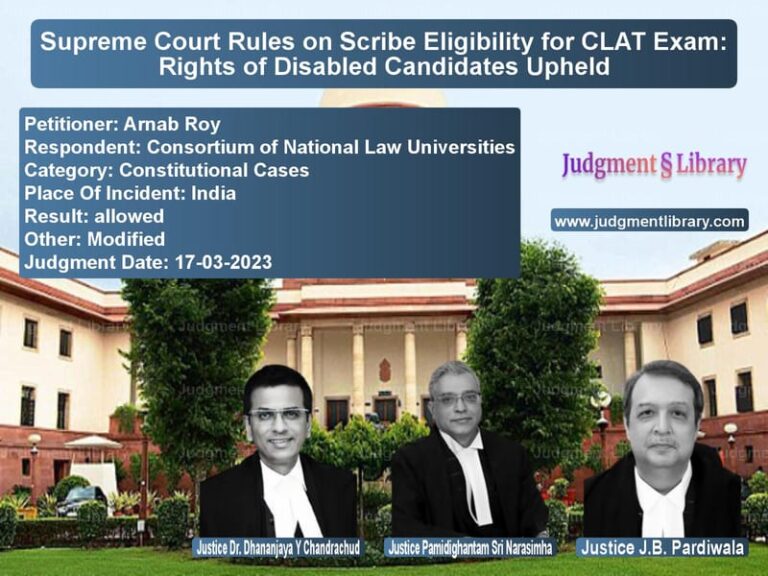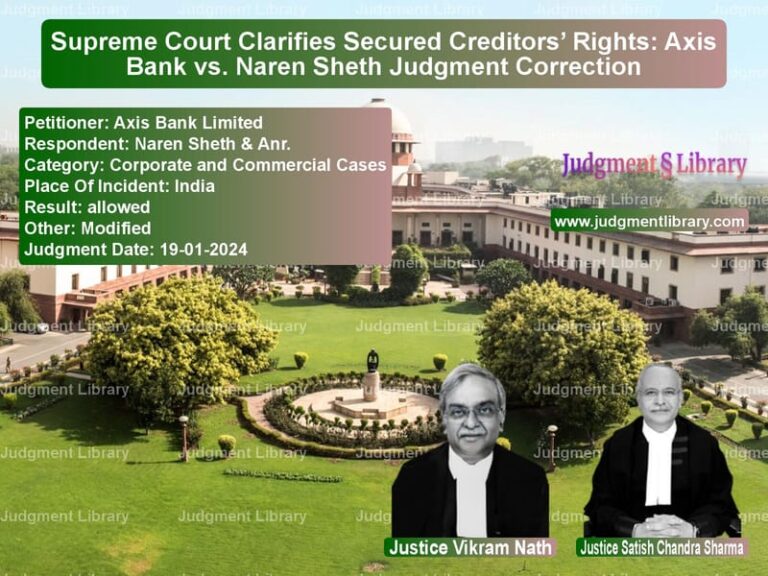Execution of Arbitration Awards: Supreme Court’s Verdict on Judicial Overreach
The Supreme Court of India, in its landmark judgment in M/S Kohinoor Transporters vs. State of Uttar Pradesh, examined the role of the High Court in execution proceedings and emphasized the jurisdictional limitations in such matters. The case revolved around a long-pending arbitration award and the subsequent execution proceedings, wherein the High Court directed the appointment of a Chartered Accountant to reassess the amount due. The Supreme Court, however, ruled that this action was in excess of jurisdiction and reiterated the role of the Executing Court under Section 47 of the Code of Civil Procedure (CPC).
The ruling is significant as it establishes clear judicial guidelines for the execution of arbitral awards and underscores the importance of procedural discipline in such cases.
Background of the Case
The dispute originated from a contract signed in 1980 between M/S Kohinoor Transporters and the State of Uttar Pradesh for certain civil works. The disagreement led to arbitration under the Arbitration Act, 1940, resulting in an award dated 20 July 1984. Subsequently, the Civil Judge, Dehradun, made the award a Rule of the Court on 30 August 1986. However, the rate of interest on the award was reduced from 12% to 6%.
The State of Uttar Pradesh challenged the award, but the High Court of Uttaranchal dismissed its appeal on 15 December 2006, thereby granting finality to the award.
Execution Proceedings and the High Court’s Intervention
Despite the finality of the award, execution proceedings continued for years. The appellant, M/S Kohinoor Transporters, filed an execution application before the Additional Civil Judge, Dehradun, in 2010 (Execution Application 27/2010). During these proceedings:
- The State of Uttar Pradesh deposited an amount of Rs. 75,65,945 towards the decretal debt.
- Both parties filed their respective statements of calculation regarding the outstanding amount.
- On 6 April 2015, the Executing Court directed the respondent to deposit Rs. 1,25,16,969.56, which was considered an ‘admitted’ amount.
- The respondent objected, but on 16 August 2016, the Executing Court dismissed its objections.
As the execution proceedings continued, the Executing Court issued another order on 3 August 2017, requiring the judgment debtor (the State) to comply with the previous order or face penalties.
Following this, the State of Uttar Pradesh filed a civil revision application before the High Court, seeking to challenge the Executing Court’s order. The High Court, instead of addressing the legal question, ordered the appointment of a Chartered Accountant to review the calculations of the decretal amount.
Petitioner’s Arguments
The petitioner, M/S Kohinoor Transporters, challenged the High Court’s decision on three primary grounds:
- The High Court acted beyond its jurisdiction by directing the appointment of a Chartered Accountant in a civil revision proceeding, which should have been handled by the Executing Court under Section 47 of the CPC.
- The respondent (State of Uttar Pradesh) had not challenged the orders dated 6 April 2015 and 3 August 2017, which required the deposit of Rs. 1.25 crore. Hence, there was no basis for further assessment.
- The High Court’s order amounted to granting final relief in an interim application, which was procedurally improper.
Respondent’s Arguments
The State of Uttar Pradesh defended the High Court’s order, contending that:
- The petitioner was inflating its claim beyond what was actually due.
- The State had already deposited Rs. 75,65,945 as of 7 December 2012.
- The Executing Court did not have the power to modify or reassess the award amount.
Supreme Court’s Observations
The Supreme Court critically examined the High Court’s order and ruled that it was legally unsound. The key observations made by the Court were:
- “The High Court has acted in manifest excess of its jurisdiction while directing the appointment of a Chartered Accountant for determining whether the decretal debt is to be marked as satisfied.”
- “The execution proceeding is pending before the Additional Civil Judge, Dehradun, and various orders have been passed from time to time. The issue of whether the decree has been discharged or satisfied has to be determined by the Executing Court under Section 47 of the CPC.”
- “The Executing Court must execute the decree as it stands without adding anything to it.”
The Court underscored that the High Court had erred by interfering with an execution matter that fell squarely under the domain of the Executing Court. The appointment of a Chartered Accountant was an unnecessary and unwarranted step, as the decree’s execution should have proceeded based on existing orders.
Final Judgment
The Supreme Court allowed the appeal and set aside the High Court’s order dated 18 September 2017. It directed the High Court to expeditiously dispose of the pending civil revision application within three months.
The ruling reiterates the fundamental principle that execution courts must enforce decrees as they stand, without any judicial interference that alters the terms of the decree. It prevents judicial overreach in execution proceedings and ensures that arbitration awards, once finalized, are enforced without undue delay.
Petitioner Name: M/S Kohinoor Transporters.Respondent Name: State of Uttar Pradesh.Judgment By: Justice D.Y. Chandrachud, Justice Dipak Misra.Place Of Incident: Dehradun.Judgment Date: 21-08-2018.
Don’t miss out on the full details! Download the complete judgment in PDF format below and gain valuable insights instantly!
Download Judgment: MS Kohinoor Transpo vs State of Uttar Prade Supreme Court of India Judgment Dated 21-08-2018.pdf
Direct Downlaod Judgment: Direct downlaod this Judgment
See all petitions in Arbitration Awards
See all petitions in Dispute Resolution Mechanisms
See all petitions in Enforcement of Awards
See all petitions in Settlement Agreements
See all petitions in Judgment by Dhananjaya Y Chandrachud
See all petitions in Judgment by Dipak Misra
See all petitions in allowed
See all petitions in supreme court of India judgments August 2018
See all petitions in 2018 judgments
See all posts in Arbitration and Alternate Dispute Resolution Category
See all allowed petitions in Arbitration and Alternate Dispute Resolution Category
See all Dismissed petitions in Arbitration and Alternate Dispute Resolution Category
See all partially allowed petitions in Arbitration and Alternate Dispute Resolution Category







